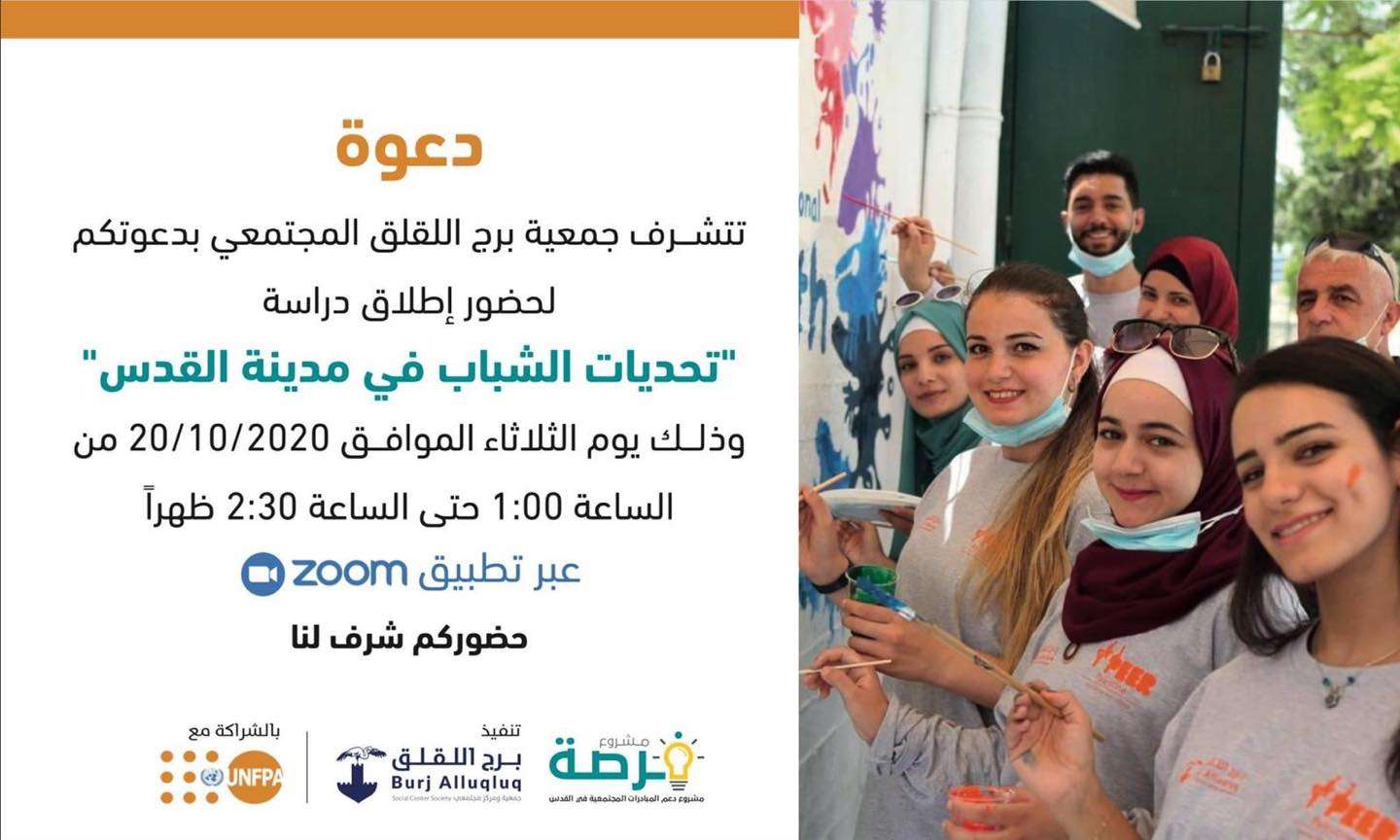“Youth Challenges in the City of Jerusalem” Burj Al-luqluq published new study
“Youth Challenges in the City of Jerusalem”
Burj Al-luqluq published new study
Jerusalem /Burj Alluqluq Social Center Society launched a new study entitled “Youth Challenges in the City of Jerusalem”, which focuses on the awareness of Jerusalemite youth of personal and social issues in the city of Jerusalem.
The study was prepared by the researcher Luisa Ruska, under the direct supervision of Burj Alluqluq Social Center Society, and the executive director, Montaser Idkedek, in addition to Farah Abu Zant, the association’s Forsa project coordinator.
The symposium was opened by the Executive Director of Burj Alluqluq Social Center Society, Muntasser Idkidik, welcoming the remarkable youth attendance, in addition to the professors participating in the discussion and interventions, then by talking about the role of Burj Alluqluq Social Center Society in the study, and after the welcome and opening speech, the educational advisor, Dr. Yahya Hegazy, was presented to review the study and the most important thing in it.
Dr. Yahya tried to examine the variables in the educational aspect, review the youth’s challenges in the issue of economic empowerment, and examine the youth’s attitudes specifically regarding health. He added, “The most important thing in the study is that it presented a real examination of youth attitudes on various topics from their own point of view.”
The doctor also reviewed the results presented by the study in relation to heritage, education, health, social integration,
Heritage raises important questions and a number of recommendations for most sections of the study.
Montaser thanked Dr. Yahya for this comprehensive presentation, as he showed the most important findings and recommendations in the study in advance, Professor Mazen Al-Jabari, Director of the Youth Development Department in Jerusalem. “Thank you to Dr. Yahya for these clarifications. From the addition and knowledge of the institutions that work with the youth, in addition to the highlights and notes that must be examined. “
From the remarks of Mr. Mazen Al-Jabari, Director of the Youth Development Department:
- Education, the results are exciting, as 77% saw that education is good despite the protests, difficulties, and obstacles in the status of education in Jerusalem. For a more accurate and clearer understanding of these answers, it is necessary to know the nature of the participants in the study and where they learn. There is a gap between surveys and studies.
- Dropout, it is not enough to mention the number of dropouts in order to know this problem in the education sector. Dropout 35% is a high percentage of the highest rates in the world and it is not simple and we must pay attention to it as there are previous studies that could be a foothold, it is not enough to take Research information is as it is, but we must examine the difference between the variables in studies dealing with the same topic.
- Health also, the researcher used the Youth Development Index in education and health, and the indicators were very high, for example, 92% feel that the situation is excellent and good, and this also needs to be examined. The sources that young people obtain remain hypothetical or inaccurate or information from the Internet, there is other information and studies.
Identity and heritage, new information is true. 77% of young people do not feel isolated. There are contradictions or two different answers. The focus groups see something that was not clear in the answer to the questionnaire.
After thanking Mr. Mazen, the director of Burj Alluqluq Social Center Society invited all institutions, youth and educational institutions to work on achieving these observations and recommendations in advance, Dr. Samir Baydoun, who started his intervention by thanking everyone, adding, “Apart from the details of the study, the most important question is how to build on this study and how to develop it, regardless of Methodology or results “and among the recommendations of Dr. Samir:
- Recommendations are private and not general. They are divided according to age group and educational level.
- The importance of communicating with institutions and people working in the field of youth to enrich the results of the study.
- Adopting a new study assessing previous interventions and their impact on the institutional or educational level.
Focusing on the challenges of youth in dealing with technology in all fields, not just in the field of health.
- The importance of involving parents.
In the intervention of Dr. Ahmed Fatiha – Head of Curricula Department
“Thank you to everyone, and I say here that we are all concerned about the East. I thank Burj Al-Luqluq for this study and we need it, as there is an absence of studies on the subject of youth. It is logical to build programs and strategies based on studies.
Notes and recommendations of Professor Ahmed Fatiha:
- This study is an opportunity to unify the efforts of all institutions working in the youth sector.
- The recommendations are general, and we need more accurate and applicable recommendations, and the transformation of a work program, without reducing but rather building on them.
- Education and systematic families have not been specifically addressed.
- Jerusalem’s privacy in studies about education and dropout.
- Volunteering and restoring the value of aid is very excellent, and these statistics should encourage us to introduce a culture of volunteering and political participation in schools.
- Why aren’t schools in Jerusalem transformed into community centers yet?
- The challenges facing people, as the inclusion of people with disabilities has led to their loss.
- Drugs .. There must be a safety net that can be a gateway to the beginning of the solution.
In the last intervention of the young man Waad Qanam, he said, “All thanks to the professors and doctors, and thank you for your comments. Thanks to the Burj Alluqluq Social Center Society , regardless of our enrichment with this type of studies. Al-Burj is a race in the subject of youth studies, and this is very important in a difficult and dangerous stage.”
- The methodology is good in terms of the period of the questionnaires, although it talks about 2019 and some references go back to 2017 or earlier in terms of sources.
- The target group is diversified, but the circumstances may differ due to the privacy of Jerusalem, outside and inside the wall? Outside and inside the old town.
Notes and Recommendations:
- Education, are the reasons for social, as the study showed? Are the respondents dropping out? Or, a greater number of dropout students should be surveyed and the results compared.
Shedding light on the political factors affecting the dropout issue, such as detention and house arrest.
- Clarifying the danger of the Israeli curriculum on the national identity of youth.
Entrepreneurial businesses have not taken their right to study, and technology and technological programs are also a source of income.
Professor Gamal Adela expressed his thanks and added that the study complements several studies that dealt with the same topic and that the beginning of tangible change is the first intifada. Perhaps the time has come to study our youth and find out what they think. My recommendation is to convert ideas into activities and events on the ground.
It is worth noting here that this study comes within the activities of the Second Jerusalem Youth Forum 2020 (Youth and the Sustainable Development Goals) within Forsa Project funded by the United Nations Population Fund UNFPA





